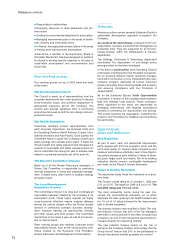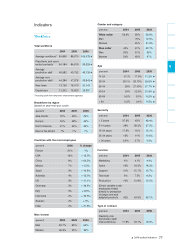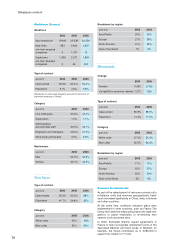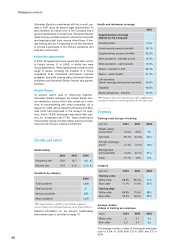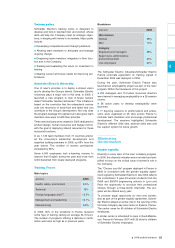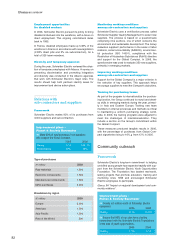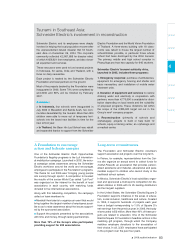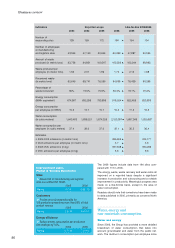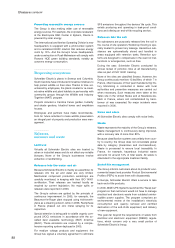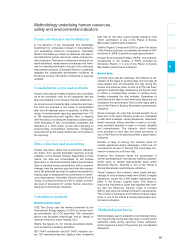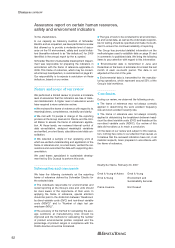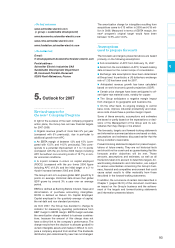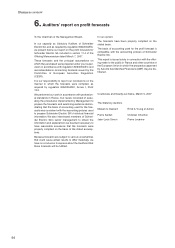APC 2006 Annual Report Download - page 86
Download and view the complete annual report
Please find page 86 of the 2006 APC annual report below. You can navigate through the pages in the report by either clicking on the pages listed below, or by using the keyword search tool below to find specific information within the annual report.
Business review
Compliance with
international law and other
commitments
Global Compact
Launched in 1999 by UN Secretary-General Kofi
Annan, the Global Compact brings companies and
non-governmental organizations together under the
aegis of the United Nations to “unite the power of mar-
ket with the authority of universal ideals”. Signatories
are expected to embrace, support and enact ten prin-
ciples in the areas of human rights, labour standards
and the environment. Schneider Electric publicly
expressed its support for universal values by joining
the Global Compact in December 2002. The Group
has primarily worked to share this commitment with its
partners since 2003.
World Health Organization
Schneider Electric uses the World Health Organiza-
tion’s definition of health in defining its policies (“Health
is a state of complete physical, mental and social well-
being and not merely the absence of disease or infir-
mity”).
Diversity Charter
Schneider Electric signed the Diversity Charter
launched by
Institut Montaigne
in 2004. Going beyond
France, the Group has decided to apply the charter’s
principles in all host countries or to update similar poli-
cies, for example in the United States.
Apprenticeship Charter
(France)
Schneider Electric has signed an apprenticeship char-
ter in France. The charter grew out of the Group’s ini-
tiatives after Jean-Louis Borloo, the French Minister for
Employment, Social Cohesion and Housing chose
Henri Lachmann to lead a specific mission to promote
corporate support for developing apprenticeship.
Observatoire
Social International
Schneider Electric also takes part in the work of the
Observatoire Social International
(OSI). It has signed
on to the “right to lifelong education and training”,
which aims to develop a relationship of partnership
and co-responsibility between companies and educa-
tors and trainers.
Other associations
Schneider Electric leads discussions on management
and societal issues within the
Institut de l’Entreprise
think tank. It is a member of the Board of Directors of
the French study center for corporate responsibility
(ORSE) and of the French Global Compact network.
For many years, the Group has also actively support-
ed
Association pour le développement du mécénat
(Admical), a French not-for-profit organization involved
in corporate sponsorship issues that is a member of
the Ceres European network, and
Institut du mécénat
social
(IMS), an association that helps companies
implement their corporate social responsibility policies.
Standards organizations
Schneider Electric plays an active role within AFNOR,
the French standards organization. In particular, it par-
ticipates in the working group on sustainable develop-
ment. The Group also works with international stan-
dards organizations in developing the standards that
apply to its products. These organizations include
France’s
Union Technique de l’électricité et de la com-
munication
(UTE), the European Committee for Elec-
trotechnical Standardization (CENELEC), the Interna-
tional Electrotechnical Commission (IEC) and the
International Standards Organization (ISO).
Impact on regional
development and community
relations
Wherever it operates, the Group makes a strong com-
mitment to community partners. This is indispensable
for a global enterprise that wants to keep in touch with
real-life conditions in its local markets. Numerous proj-
ects under way and on the drawing board demonstrate
Schneider Electric’s desire to be engaged, notably in
the area of employment, and to contribute fully to local
economic development.
Agreements
As of end-2006, Schneider Electric’s main sites in
France (including all manufacturing facilities) had
signed target agreements with officials in charge of
local development. These agreements cover inclusion,
diversity and economic development. They strengthen
Schneider Electric’s presence in its local employment
pools, notably by creating a tighter network with local
bodies involved in economic development.
Youth opportunities
Schneider Electric has been involved in training pro-
grams for disadvantaged youth and high school non-
completers for many years. Team members’ involve-
ment in these programs has been a key success fac-
tor. In each host country, the Group looks for the most
effective way to make a difference, from partnerships
with schools and associations to financial support for
young students and participation in technical or gener-
al training courses. These programs dovetail with the
partnerships forged through the Schneider Electric
Youth Opportunities Foundation (see "Community out-
reach" page 82).
84


